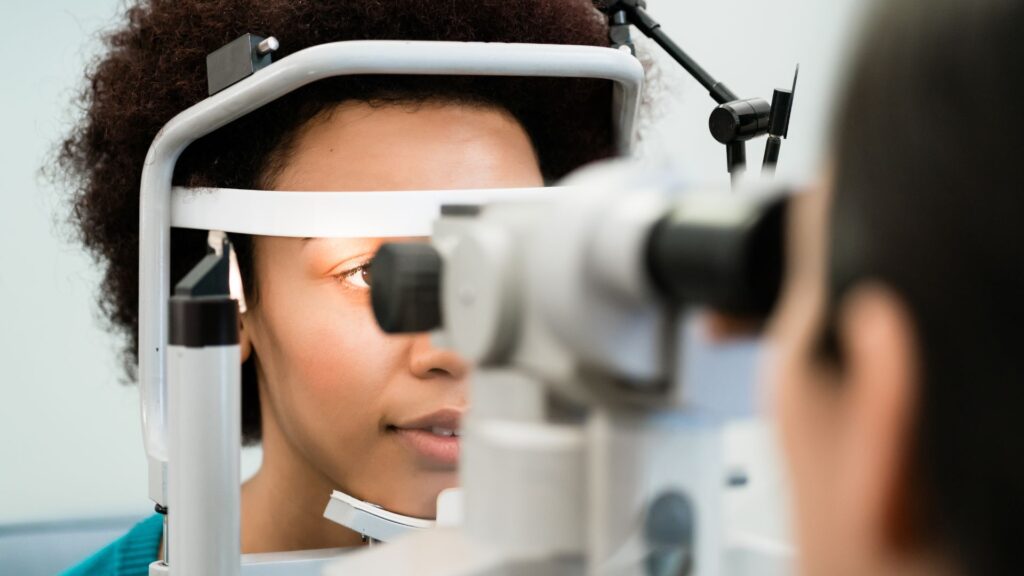In This Issue: August 2023
- 8 Tips for Children’s Eye Safety
- Diagnosis: AMD. What Now?
- Happy National Dog Month!
- When to See an Ophthalmologist

8 Tips for Children’s Eye Safety
August is Children’s Eye Health and Safety Month. There are a few common warnings most parents tell kids to help protect their eyes: never look directly at the sun (even during an eclipse) and don’t shoot projectile toys directly at another person’s face. But there are other eye safety tips that may not be quite as obvious. We encourage you to incorporate these safety tips with your entire family:
- Wear polycarbonate safety glasses when using a lawn mower or weed trimmer and keep others at a safe distance away to avoid debris flying into an eye.
- Wear 99-100% UV protection sunglasses any time you are outdoors. Wraparound styles are best.
- Wear polycarbonate sports glasses during recreational or competitive sporting activities.
- Never wear novelty contact lenses that aren’t prescribed by an eye doctor – even for a short time. They can lead to a scratched cornea, an eye infection or even permanent vision loss.
- Take breaks every 20 minutes while using a digital device. Blue light filtering glasses may be helpful to reduce digital eye strain.
- Practice good contact lens hygiene: wear them the appropriate amount of time, wash hands before touching your eyes, never clean contacts with unsterile water sources.
- Never share makeup with another person. This can lead to a painful eye infection.
- Don’t use hazardous materials or mix cleaning agents when around children.
If you or your child sustains an eye injury, don’t try to treat it on your own. Call our office right away or dial 9-1-1 to get immediate help. It’s also recommended that children have eye exams every 2 years. If it’s been a while since your child’s eyes were checked, contact us at (702) 896-6043 to schedule a pediatric eye exam. We are also proud to have a pediatric ophthalmologist on staff, Dr. Naomie Warner, who can diagnose and treat a wide variety of pediatric vision problems.

Diagnosis: AMD. What Now?
Age-related macular degeneration (AMD) is a retinal eye disease that attacks your central vision. With the dry form AMD, clumps of a protein called drusen start to grow on your thinning macula (the center of the back of your eye). This causes gradual central vision loss, dark spots and contrast sensitivity. The wet form of AMD causes vision loss much faster: abnormal blood vessels start to grow under the retina and these leak blood/fluids into your eye causing scarring.
If you are diagnosed with AMD, your doctor will recommend you use an Amsler grid every day to monitor your vision. This simple, quick test will help you notice changes to your eyesight that you can report back to your doctor. In addition to using an Amsler grid, there are lifestyle changes you can make to slow the progression of this disease:
- Stop smoking
- Exercise regularly
- Eat colorful, fresh foods
- Incorporate omega 3 fatty acids into your diet
- Take AREDS 2 (Age-Related Eye Disease Studies) vitamin supplements with your doctor’s approval
There are also in-office treatments and medications that can help control vision loss from AMD. If you are experiencing any changes in your vision, we hope you will schedule an eye exam as soon as possible. Early detection and treatment may be sight-saving! Contact us today at (702) 896-6043 or click below.

Happy National Dog Month!
Celebrate your furry friends this month! Here are some ideas to pamper your pup: get them a pair of doggles (sunglasses for dogs), treat them to puppy ice cream or just take a few additional trips to the park this month. Any extra attention you show is sure to result in tail-wagging appreciation!

When to See an Ophthalmologist
An optometrist (OD) can be thought of as a primary care doctor for your eyes. This person can perform eye exams and vision tests to identify vision problems and prescribe treatments. An ophthalmologist (MD) is a specialist who provides treatment for vision correction and complex vison problems, often through surgery, medication or other methods. You would want to see an ophthalmologist in these situations:
- You want to have LASIK or another vision correction procedure
- You are experiencing floaters, flashes, dark spots or cloudiness in your vision
- You are diabetic and need monitoring for diabetic retinopathy
- You have sustained a serious eye injury
- You have persistent dry eye and need advanced treatment
At Nevada Eye Physicians, our team consists of 2 optometrists and 9 ophthalmologists. We are truly here to help your eyes in any way we can! Contact us today at (702) 896-6043 to schedule an appointment to stay proactive with your eye health.



